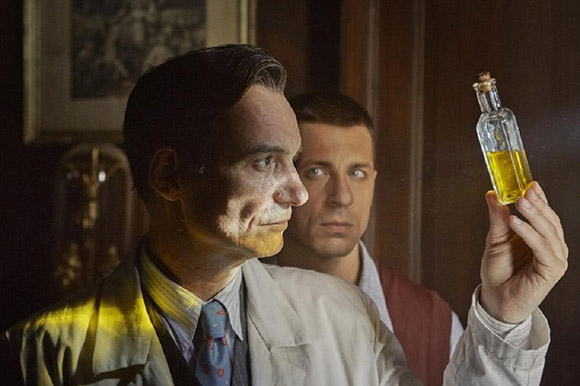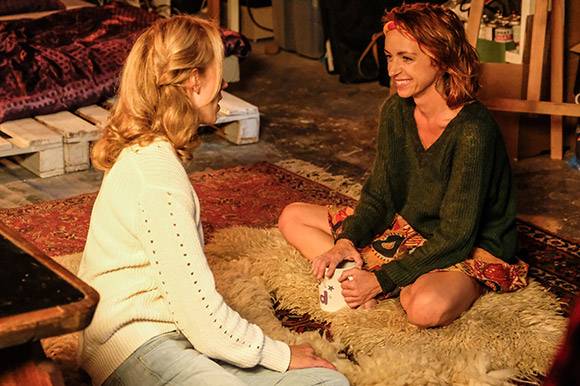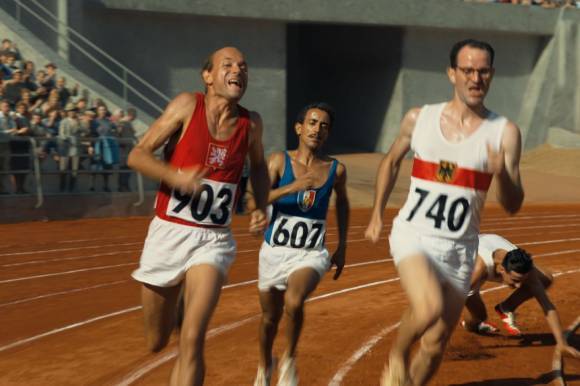“The biggest challenge was not to go crazy. We tried not to succumb to depression,“ explained Jiří Flígl, the director of Aero Cinema, the legendary art cinema in Prague. “The turn of 2021 and 2022 was not good: COVID-19 was still an issue, and no one was going anywhere much,“ he continued, explaining that this was the case througout the main cinema seasons, that is autumn - October to December - and winter - January to March.
“To cope this fall was challenging mentally and financially. I talked to cinema operators from all over the country, and those who tried hard and regularly organised some extra events were very exhausted. When you work all day and then only 50 people come to the cinema instead of 200, it exhausts you. It wasn't much better in our cinema, but in Prague it still worked somehow, although it was far from the previous years’ results,“ Mr Flígl added.
The statistics substantiate this experience. In 2021, audience numbers only increased by 11.85 per cent over 2020 levels, with 7,141,609 admissions, while net sales only rose by 20.18 per cent – registered at 1 088 857 375 Kč - according to data published by the Union of Film Distributors (UFD).
 Across the country, Michal Fidler, the manager at a cinema in Rýmařov, a small town in northern Moravia, also echoed this sober assessment from his on-the-ground experience. “People are returning to the cinema very slowly and it will take some time before we return to normal attendance, if ever. People are quite used to living online now, which is not very good for cinemas,” he said, admitting that the cinema he manages works a little differently than exhibitors in the capital, since it is part of an arts and culture centre which also curates other forms. “We screen films only a few days a week and we have work elsewhere in the culture house. Cinema is more of a supplementary to the Leisure Center of Rýmařov. Of course, we mainly program more attractive films, but they do not always meet expectations. For example, only about 25 people came together for three performances of Jan Svěrák's new film Bethlehem Light,” he attested.
Across the country, Michal Fidler, the manager at a cinema in Rýmařov, a small town in northern Moravia, also echoed this sober assessment from his on-the-ground experience. “People are returning to the cinema very slowly and it will take some time before we return to normal attendance, if ever. People are quite used to living online now, which is not very good for cinemas,” he said, admitting that the cinema he manages works a little differently than exhibitors in the capital, since it is part of an arts and culture centre which also curates other forms. “We screen films only a few days a week and we have work elsewhere in the culture house. Cinema is more of a supplementary to the Leisure Center of Rýmařov. Of course, we mainly program more attractive films, but they do not always meet expectations. For example, only about 25 people came together for three performances of Jan Svěrák's new film Bethlehem Light,” he attested.
Indeed, the unstable figures persisted despite the influx of big film premieres on the reopening of cinemas on 23 May 2021, with American genre films, Academy Award nominees, new Czech films and documentaries, as well as Czech classics launching on cinema screens across the country.
A total of 241 films premiered in the seven months of 2021, including 86 Czech titles. The top five most popular films in cinemas across this period were: the Czech comedy, Prvok, Šampón, Tečka a Karel by director Patrik Hartl; Spider-Man: No Way Home directed by Jon Watts; the Czech biopic Zátopek, about the Olympic gold winner Emil Zátopek, directed by David Ondříček; Karel, a Czech documentary about the famous singer Karel Gott, directed by Olga Špátová; and the latest in the James Bond franchise, No Time To Die by Cary Joji Fukunaga.
In contrast, 2020 experienced a slump in the number of films released, with Czech theatres forced to close for more than half the year – 223 days – from 13 March to 10 May 2020, and later, from 12 October to 23 May 2021. Moreover, even once open, exhibitors had to ensure they abided by the health restrictions imposed because of the pandemic: for several months, only those who had been vaccinated, or had immunity as a result of a previous infection, were allowed to enter a cinema, and once inside, the rule imposing mask-wearing persisted until 14 March this year, 2022.
“At first, the biggest challenge was not to collapse psychically under the unprecedented situation and stay optimistic,“ said Barbora K. Prágerová, the director of Metro 70, a cinema in Prostějov (who also serves as the vice-president of the Association of Cinema Operators (APK), a network which brings together 225 operators, including municipal and private cinemas, as well as several multiplex networks.
However, she continued, “over time, the professional community has become more cohesive than before, during the cinema closure period. The APK and other entities soon began operating online cinemas, with various sub-initiatives to maintain continuity in communication with the audience. Of course, the challenge was also to be able to temporarily adjust the cinema operation so that it would affect the employees as little as possible,“ she attested. To this end, “as soon as the opportunity arose, we joined the online cinema project and adapted our website, networks and communication accordingly.“
Once cinemas reopened – under specific conditions – Metro 70 had to adapt to these changed conditions by constantly editing the cinema profile, changing the permitted capacities, informing patrons of the current conditions of entry, and “at the same time we tried not to create the impression of prison wardens in front of the cinema - which was often not possible. Sometimes it was not easy to remain aware of the governmental measures currently in force, as they were constantly changing, and the confusion, along with the measures, discouraged many viewers from visiting the cinema,“ Ms Prágerová said.
Yet, despite these mitigation measures, some films did make it to the screen and did prove popular. In 2020, a total of 175 premieres, which mainly consisted of festival and European arthouse titles, including 45 Czech films, were screened at cinemas. The top five films were all national Czech titles, namely: Caught in the Net / V síti, a documentary about online predators, directed by Vít Klusák and Barbora Chalupová; Czech romantic-comedy A Too Personal Acquaintance / Příliš osobní známost by Marta Ferencová; 3Bobule, a comedy set in a vineyard, directed by Martin Kopp; Charlatan / Šarlatán, a biopic of Czech healer Jan Mikolasek, directed by famous Polish auteur Agnieszka Holland; and another romantic comedy, Chlap na střídačku helmed by Petr Zahrádka.
Moreover, the government’s support systems in 2020 went a long way to support the sector in this fraught times, Aero Cinema’s Jiří Flígl also attested. “We would not be here without various support programmes and compensation from the State Film Fund and the Ministry of Labour, and this applies to all private cinemas. The second wave was very brutal, everyone was saving money, and there was not much solidarity that took place, in terms of activities towards the audience. Online screenings did not work as well as in the first euphoric phase. However, thanks to these compensations, the situation did not suck us out of all reserves,“ he said.
 Today, he continued, referring to events such as the Hardcore Spectator Festival, specialising in camp, horror or B and C films, which took place from 28 February to 6 March 2022, the situation is looking up. “Things now look more optimistic: Festival otrlého diváka worked beautifully in Aero cinema, plus some non-film events, like a travel lecture, sell out the hall. When the duty to show proof of vaccination or immunity ended in February, there was a significant increase in the number of viewers. People are coming now and March will be good for Aero, thanks to those extra events.”
Today, he continued, referring to events such as the Hardcore Spectator Festival, specialising in camp, horror or B and C films, which took place from 28 February to 6 March 2022, the situation is looking up. “Things now look more optimistic: Festival otrlého diváka worked beautifully in Aero cinema, plus some non-film events, like a travel lecture, sell out the hall. When the duty to show proof of vaccination or immunity ended in February, there was a significant increase in the number of viewers. People are coming now and March will be good for Aero, thanks to those extra events.”
Looking ahead, Mr Flígl was cautiously hopeful: ”We'll see how it goes, knowing that we will soon enter a weak season when the weather is nice and people want to be outside. It will depend on how strong the film titles will be. In autumn and winter the number of admissions decreased the most for quality mainstream films. People went to see blockbusters, while art festival films remained at similarly low numbers. But films like Belfast or C‘mon C‘mon fail. We used to be able to deduce from pre-sales how many people would eventually arrive. Now it seems that people are not making longer-term plans for culture so much, so there is more uncertainty.”
In terms of investments, the director said they “will not make hasty investments, because there is no money for it. No one will renovate now.” Moreover, the war in Ukraine may also impact the sector: ”We were lucky that the pre-sale of Festival otrlého diváka started before the invasion and people perceive the festival as fun, where they could rest after all day of watching the news. I know that another festival was affected: for four days after the invasion no-one bought a ticket in its presale, as people were not interested in films.”
Barbora K. Prágerová from Metro 70 also echoes this sense of caution. ”People are gradually returning when the expected premieres are released. Of course, the global and Czech market have been affected by the pandemic, and often we, and other cinemas, have to reconsider some of our positions (such as the periodicity of programming), but viewers have not escaped en masse to VOD (some foreign polls estimate the number of definite renegades well under 10 percent) and have returned to the cinemas. We are counting on a strong summer season (also due to the growing interest in summer cinemas), also with several titles that will fill our halls to the brim. However, we must also take into account the possibility of the situation deteriorating again in the autumn and the fact that some of the effects of the pandemic will be fading for a long time. However, we have managed to stay optimistic in Metro 70,” she concludes.




















